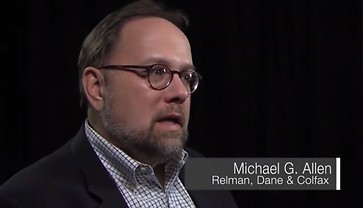Securing Accessible, Affordable Housing in Los Angeles
In August 2016, Relman Colfax settled the largest affordable housing accessibility case in the nation’s history, securing a significant victory for people with disabilities in Los Angeles. As a result of the settlement, at least 4,000 affordable and highly accessible housing units in the City will be built and rented to people who need them, addressing the critical shortage of accessible housing in California’s most populous city.
Background: A Severe Shortage of Accessible, Affordable Housing
The firm represented the Independent Living Center of Southern California, Communities Actively Living Independent and Free and the Fair Housing Council of the San Fernando against the City of Los Angeles and its Community Redevelopment Agency (CRA). The complaint alleged that, since 1988, affordable housing funded by the defendants had failed to meet the accessibility requirements of federal law, specifically the Americans with Disabilities Act (ADA) and Section 504 of the Rehabilitation Act of 1973. The developments were thousands of units short of the required number of accessible units, and the defendants lacked policies to ensure that accessible units were actually rented to people with disabilities. The result: thousands of people with disabilities were consigned to inaccessible housing, nursing homes, cars, homeless shelters, or the streets of Los Angeles.
Key Case Developments
Early Litigation Victories
Litigation began in January 2012, and the firm and its co-counsel at Disability Rights California, Disability Rights Legal Center, and the Law Offices of David Geffen won a number of early victories. Among these was a decision denying defendants’ motion to dismiss the case. In that ruling the judge held that the ADA and Section 504 imposed “program accessibility” requirements on defendants that included an obligation to ensure that private housing development owners receiving public funds comply with accessibility requirements. Other interim victories included orders blocking defendants’ attempts to avoid liability by shifting it to those owners and an order requiring the defendants to turn over all documents relevant to the more than 700 developments comprising their affordable housing programs.
Discovery Victories Build Settlement Momentum
Another key victory came in July 2015, in the form of an order compelling the City to turn over measurements and photographs documenting inaccessible conditions in more than 200 apartment complexes. Plaintiffs’ experts subsequently reviewed these measurements, conducted on-site accessibility surveys and reviewed the plans of hundreds of additional complexes, documenting significant violations of federal and state accessibility requirements at every single building.
Once it became clear that its own experts had documented significant accessibility violations, the City began to negotiate in earnest to resolve the architectural and programmatic accessibility violations that had occurred over nearly three decades.
Settlements with the City of Los Angeles and Community Redevelopment Agency
In the face of this overwhelming evidence of its failure to comply with the law, the City agreed to a settlement, effective September 5, 2016. The historic agreement provides that, within 10 years, Los Angeles must ensure that at least 4,000 of its affordable housing units meet architectural standards required by the Uniform Federal Accessibility Standards (UFAS), guaranteeing much larger maneuvering clearances at doors, accessible roll-in or transfer showers, pre-installed grab bars in bathrooms, lowered kitchen counters, and greater access to appliances.
The City also agreed to enforce policies ensuring that those units are inhabited by people who need the accessibility features provided, ending the common practice among local developers of renting what few accessible units they’d built to people who didn’t need their accessibility features.
In all, Los Angeles committed to spend at least $200 million to provide the required accessibility, as well as an additional $4.5 million to the three plaintiff organizations, to be used to help people with disabilities transition into newly accessible homes.
Rather than settle, the CRA sought refuge in an argument that the 2012 California legislation that dissolved such agencies also barred recovery for violations of the law before their dissolution. In August 2016, the Court rejected this argument. Settlement negotiations began soon after, and eventually concluded in September 2017, with the CRA agreeing to provide an additional 250 UFAS-compliant units within three years, require owners to comply with City accessibility policies, and pay $3 million in damages to the plaintiff organizations.
The City also agreed to enforce policies ensuring that those units are inhabited by people who need the accessibility features provided, ending the common practice among local developers of renting what few accessible units they had built to people who did not need their accessibility features.
Impact: Sending the Message that City Housing Programs Must be Accessible
The settlements aim to correct decades of noncompliance with federal accessibility requirements. The addition of 4,000 units of highly accessible affordable rental housing will permit Angelenos with disabilities to get out of institutional settings, like nursing homes, group homes and homeless shelters, and reconnect with their communities. The firm and its co-counsel worked closely with the City to develop an innovative set of housing management policies that will ensure that accessible units actually go to tenants who need them.
More broadly, the sheer size and scope of the settlements with the City and CRA send a message to municipal affordable housing programs across the country that ignoring federal accessibility requirements comes at a steep price. In the wake of the settlements, the firm has consulted with disability and fair housing groups about similar litigation in all regions of the country.
The Case Team
The litigation team at Relman Colfax was led by Michael Allen, Jenn Klar, John Relman, and Laura Arandes. Co-counsel included Dara Schur and Autumn Elliott of Disability Rights California, Maronel Barajas of Disability Rights Legal Center, and David Geffen.
Case Caption
Independent Living Center of Southern California v. City of Los Angeles, No. 12-551 (C.D. Cal.)

